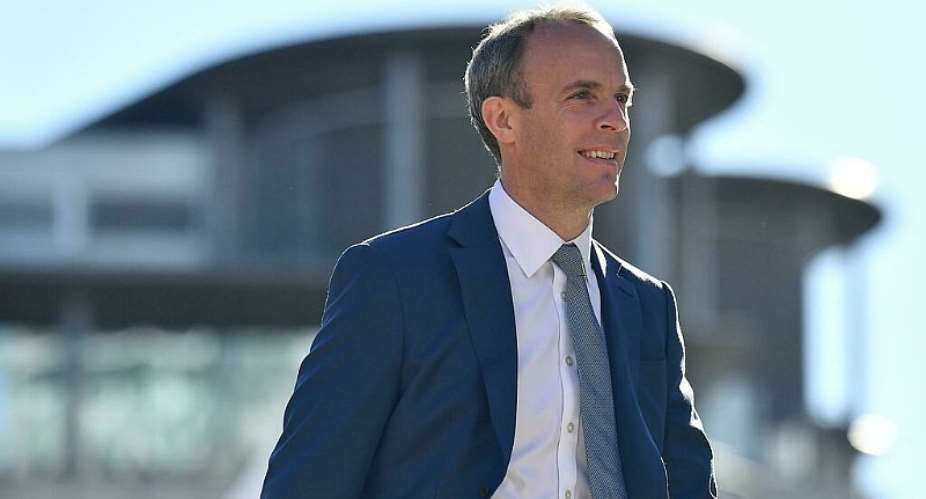Britain's justice minister on Sunday presented plans to change key rights legislation to stop the European Court of Human Rights (ECHR) from "dictating" to the UK. His proposals have been met with sharp criticism from opposition MP's and human rights activists.
Justice Secretary Dominic Raab said in an interview with The Sunday Telegraph that the ECHR was demanding too many "obligations on the state".
The UK Human Rights Act passed in 1998 incorporates the European Convention on Human Rights into UK law. This was not directly impacted by Brexit as neither the Convention nor the court are part of the EU.
The minister, himself a lawyer, said he is formulating a mechanism to allow the government to introduce ad hoc legislation to "correct" ECHR judgements when British ministers believe they are "incorrect".
"Nonsensical"
Raab, who served as foreign minister until a September reshuffle, announced an overhaul of the UK rights act at the Conservative Party conference this month, calling it "nonsensical".
He said at the time that the reforms could be achieved without the UK pulling out of the European Convention on Human Rights.
There was strong criticism of Raab's remarks.
Scrapping human rights protections because you don't like abiding by the law, all while the justice system crumbles. The new justice secretary shows his true colors," tweets David Lammy, a Labour MP and shadow Justice Minister.
Raab cited cases in The Sunday Telegraph where foreign criminals have avoided deportation by citing their right to family life under the rights act.
He also listed obligations imposed by the ECHR on military operations overseas and complained that under the current rights act, judges are required to take into account ECHR decisions when considering cases involving institutions such as the NHS state-funded health service.
"I don't think it's the job of the European Court... to be dictating things to, whether it's the NHS, whether it's our welfare provision, or whether it's our police forces," Raab said.
Jolyon Maygham, founder of the anti-Brexit Good Law Project, an anti-Brexit NGO, tweeted that "forty-seven countries have signed the Convention for the Protection of Human Rights and Fundamental Freedoms. It sets out universal protections a people should have from their Government. What sort of a Government would seek to remove them? And why?"
Raab said he expected his planned reforms to be submitted for consultation in the next two months.





 Dumsor must stop vigil part 2: We’ll choose how we demonstrate and who to partne...
Dumsor must stop vigil part 2: We’ll choose how we demonstrate and who to partne...
 2024 elections: NDC stands on the side of morality, truth; NPP isn't an option —...
2024 elections: NDC stands on the side of morality, truth; NPP isn't an option —...
 Akufo-Addo has moved Ghana from 'Beyond Aid' to ‘Beyond Borrowing’ — Haruna Idri...
Akufo-Addo has moved Ghana from 'Beyond Aid' to ‘Beyond Borrowing’ — Haruna Idri...
 Train crash: NDC is full of evil mindset; driver who 'deliberately' parked the c...
Train crash: NDC is full of evil mindset; driver who 'deliberately' parked the c...
 Dumsor: Energy Minister must be fired; it’s becoming unbearable — IES
Dumsor: Energy Minister must be fired; it’s becoming unbearable — IES
 #DUMSORMUSTSTOP: IMANI responds to Yvonne Nelson's call for a joint vigil
#DUMSORMUSTSTOP: IMANI responds to Yvonne Nelson's call for a joint vigil
 'Obiara b3didi' — Manhyia South NPP Chairman fights for resourcing of NPP grassr...
'Obiara b3didi' — Manhyia South NPP Chairman fights for resourcing of NPP grassr...
 Dumsor: This thing is becoming unbecoming, collapsing our business — Nana Ofori ...
Dumsor: This thing is becoming unbecoming, collapsing our business — Nana Ofori ...
 Dumsor: It'll be no more by the end of April — Gideon Boako assure Ghanaians
Dumsor: It'll be no more by the end of April — Gideon Boako assure Ghanaians
 "I can now see clearly with my two eyes, thanks to the generosity of Afenyo-Mark...
"I can now see clearly with my two eyes, thanks to the generosity of Afenyo-Mark...
